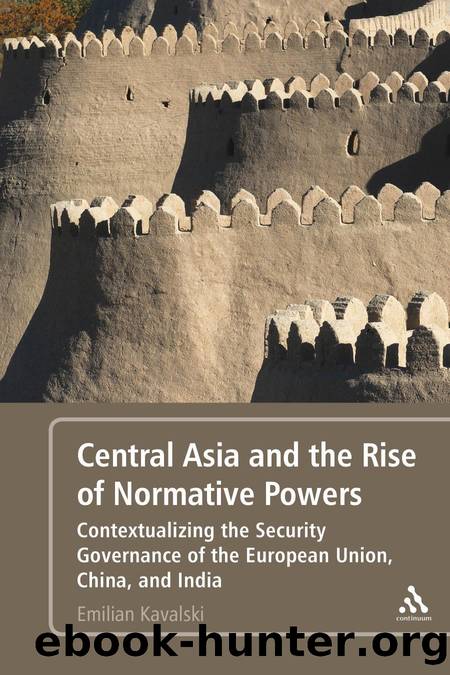Central Asia and the Rise of Normative Powers: Contextualizing the Security Governance of the European Union, China, and India by Emilian Kavalski

Author:Emilian Kavalski [Kavalski, Emilian]
Language: eng
Format: epub
Tags: International Relations, Political Science, Security (National & International), Terrorism, General
ISBN: 9781441167330
Google: 1orFAgAAQBAJ
Goodreads: 17017051
Publisher: Bloomsbury Academic
Published: 2010-11-15T00:00:00+00:00
Conclusion
By indicating the overlapping contexts of Chinaâs normative power, the analytical synthesis of this chapter has suggested that the institutionalization of SCO affords Beijing an opportunity to project itself as a blueprint for the future trajectories of Central Asian states. Consequently, Chinaâs involvement in the region has exhibited the socializing effects of Beijingâs normative power. In this setting, Chinaâs influence in the region has been assisted by its ability to articulate self-reflexive security governance policies premised on the centrality of sovereignty and the economic benefits of its âpeaceful rise.â These, in turn, have assisted Beijing to âShanghaiâ the region into its orbit of influence. However, instead of being hijacked by force or trickery, the region has slowly, but surely been socialized into Beijingâs worldview through the promotion of various initiatives for regional cooperation. The claim here is that it is Chinese definitions of the ânormalâ that have provided the âsustainable nutrientsâ for this process (Song, 2011, p. 63).
Not surprisingly, focusing on the network of intertwining relations between regional states and China through different infrastructural, economic, and security projects, Pierre Morel, the EU Special Representative to Central Asia, has referred to the SCO both as a âmirror of new trends in an unstable worldâ and as a âbarometer of a new relationship in the makingâ (Morel, 2008). Such statements indicate the recognition of Chinaâs emergence as a viable model for Central Asia by offering âpractical means of changing rent-seeking incentivesâ (Bhatty and Auty, 2006, p. 255). The argument, therefore, is that the framework of normative power offers a relevant setting for evaluating Chinaâs capacity to engage other states. The participation of Central Asian states in Chinese-promoted initiatives (such as the SCO) exhibits their socializing effects on the region by generating meaningful community of practice. However, the effects of its normative powerâdescribed as an attempt to shape the attitude of other statesâare felt beyond Central Asia. In fact, âthe main characteristic of Chinaâs great peripheral diplomacy is to establish a foothold in Asia and look toward the world.â36 In this respect, some commentators have asserted that Beijingâs security governance of Central Asia also instances its emergent global foreign policy strategy âto secure and shape a security, economic, and political environment that is conducive to Chinaâ (Zhang and Tang, 2005, p. 48).
Bearing in mind the unpredictability and disorder characterizing the external relations of ânewly established states in a poorly defined region,â the development of SCO emerges as âa major accomplishmentâ and âChinaâs greatest success in regional multilateralismâ (Womack, 2008, p. 274). The concluding chapter of this book will reveal that such agency is intimately intertwined with Chinaâs struggle for recognition. The assertion is that Chinaâs Central Asian policies are part and parcel of a strategy for the acquisition of âgreater prestigeâ by advertising Beijingâs âpresence gigantesqueâ and emphasizing âits desire to be a participant in international discourseâ (Lanteigne, 2005, p. 29; emphasis in original).
Download
This site does not store any files on its server. We only index and link to content provided by other sites. Please contact the content providers to delete copyright contents if any and email us, we'll remove relevant links or contents immediately.
The Secret History by Donna Tartt(19058)
The Social Justice Warrior Handbook by Lisa De Pasquale(12187)
Thirteen Reasons Why by Jay Asher(8894)
This Is How You Lose Her by Junot Diaz(6877)
Weapons of Math Destruction by Cathy O'Neil(6267)
Zero to One by Peter Thiel(5789)
Beartown by Fredrik Backman(5737)
The Myth of the Strong Leader by Archie Brown(5500)
The Fire Next Time by James Baldwin(5432)
How Democracies Die by Steven Levitsky & Daniel Ziblatt(5216)
Promise Me, Dad by Joe Biden(5144)
Stone's Rules by Roger Stone(5081)
A Higher Loyalty: Truth, Lies, and Leadership by James Comey(4954)
100 Deadly Skills by Clint Emerson(4921)
Rise and Kill First by Ronen Bergman(4780)
Secrecy World by Jake Bernstein(4742)
The David Icke Guide to the Global Conspiracy (and how to end it) by David Icke(4709)
The Farm by Tom Rob Smith(4502)
The Doomsday Machine by Daniel Ellsberg(4485)
